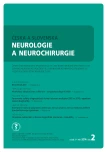-
Medical journals
- Career
Cervical Epidural Abscess – Two Case Reports
Authors: R. Chaloupka; L. Ryba
Authors‘ workplace: Ortopedická klinika LF MU a FN Brno
Published in: Cesk Slov Neurol N 2014; 77/110(2): 240-242
Category: Case Report
Overview
Epidural abscess (EA) continues to remain a rare and serious disease associated with considerable mortality. The difficult and frequently delayed diagnosis is a major problem associated with this condition. Early surgical treatment, together with long-term administration of antibiotics, may prevent development of a neurological deficit or alleviate it. The aim of this paper is to emphasise the need for individualized surgical treatment. The authors present two case reports of polymorbid patients with cervical EA associated with severe quadriparesis. A multi-stage therapy with four surgeries through anterior approach was used in the first patient with a ventral EA. Following a long-term treatment, his neurological findings showed significant improvement. The second patient with a dorsal EA and concomitant spinal stenosis had laminoplasty through dorsal approach; his neurological findings improved but he died from cardiopulmonary failure six weeks after the surgery.
Key words:
cervical spine – epidural abscess – surgical treatment
The authors declare they have no potential conflicts of interest concerning drugs, products, or services used in the study.
The Editorial Board declares that the manuscript met the ICMJE “uniform requirements” for biomedical papers.
Sources
1. Connor DE jr, Chittiboina P, Caldito G, Nanda A. Comparison of operative and nonoperative management of spinal epidural abscess: a retrospective review of clinical and laboratory predictors of neurological outcome. J Neurosurg Spine 2013; 19(1): 119–127.
2. Reihsaus E, Waldbaur H, Seeling W. Spinal epidural abscess: a meta-analysis of 915 patients. Neurosurg Rev 2000; 23(4): 175–204.
3. Nathoo N, Narotam PK, Nadvi SS, van Dellen JR. Epidural abscess. J Neurosurg Pediatr 2013; 11(3): 356–358.
4. Avilucea FR, Patel AA. Epidural infection: Is it really an abscess? Surg Neurol Int 2012; 3 (Suppl 5): S370–S376.
5. Shah NH, Roos KL. Spinal epidural abscess and paralytic mechanisms. Curr Opin Neurol 2013; 26(3): 314–317.
6. Chen SH, Chang WN, Lu CH, Chuang YC, Lui CC, Chen SF et al. The clinical characteristics, therapeutic outcome, and prognostic factors of non-tuberculous bacterial spinal epidural abscess in adults: a hospital-based study. Acta Neurologica Taiwanica 2011; 20(2): 107–113.
7. Zimmerer SM, Conen A, Müller AA, Sailer M, Taub E, Flückiger U et al. Spinal epidural abscess: aetiology, predisponent factors and clinical outcomes in a 4-year prospective study. Eur Spine J 2011; 20(12): 2228–2234.
Labels
Paediatric neurology Neurosurgery Neurology
Article was published inCzech and Slovak Neurology and Neurosurgery

2014 Issue 2-
All articles in this issue
- Autonomic Dysreflexia – a Serious Complication of Spinal Cord Injury
- Orthostatic Hypotension as a Multifactorial Abnormality after Cervical Spinal Cord Injury
- A Comparison of the Validity of the McDonald Diagnostic Criteria for Multiple Sclerosis 2005 vs 2010 in the Clinical Practice
- Development of Neurological and Functional Clinical Picture after Spinal Cord Injury
- Correlation between Brain Tissue Oxygen Monitoring Parameters and Transcranial Dopplerometry in Patients with Severe Subarachnoid Hemorrhage
- Grammaticality Judgement in Broca’s Aphasia – Two Case Studies
- Normative Values of Nerve Conduction Studies of the Ulnar and Median Nerves Measured in a Standardized Way
- Evaluation of Volume Response of Low Grade Glioma to Radiochemotherapy treated for Inoperable Progression or Residual Tumor
- Influencing the Auditory Pathway in Patients with Vestibular Schwannoma Treated with Gamma Knife Radiosurgery
- REaDY – Czech Registry of Muscular Dystrophies
- Methanol Intoxication on Magnetic Resonance Imaging – Case Reports
- Cervical Epidural Abscess – Two Case Reports
- Dravet Syndrome: Severe Myoclonic Epilepsy in Infancy – Case Reports
- Nemaline Myopathy Associated with Monoclonal Gammopathy – a Case Report
- Neuromodulation
- Alcohol Withdrawal Syndrome and Delirium – from its Pathophysiology to Treatment
- Cerebral Vasospasms Following Subarachnoid Bleeding – Diagnosis, Monitoring and Treatment Options
- Czech and Slovak Neurology and Neurosurgery
- Journal archive
- Current issue
- Online only
- About the journal
Most read in this issue- Autonomic Dysreflexia – a Serious Complication of Spinal Cord Injury
- Dravet Syndrome: Severe Myoclonic Epilepsy in Infancy – Case Reports
- Normative Values of Nerve Conduction Studies of the Ulnar and Median Nerves Measured in a Standardized Way
- Neuromodulation
Login#ADS_BOTTOM_SCRIPTS#Forgotten passwordEnter the email address that you registered with. We will send you instructions on how to set a new password.
- Career

